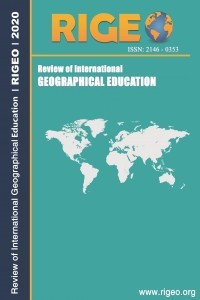Opinions of Geography Teacher Candidates about Energy Resources: A Critical Phenomenological Approach
Opinions of Geography Teacher Candidates about Energy Resources: A Critical Phenomenological Approach
Energy is mentioned as a concept that affects the policies of the country with the consumption of natural resources, with the production types in alternative and different ways, and with the effect of the economy of the countries. It is just as important to have energy sources, teaching energy sources and conveying this knowledge. It is offered in various courses from primary school to university, teaching of energy sources. And while this is also important as a field of expertise, energy resources are taught as a course in many universities in undergraduate education. It was necessary to do such a study, to determine the general knowledge and behavior of Geography teacher candidates within the scope of energy resources courseThis study is a case study of qualitative research methods. Qualitative research is the method by which data is produced without statistical operations or any other numerical means in any way. In addition, the qualitative research method is focused on one main case and based on the opinions of the participants. It is important to have flexibility in the research designed and to have an inductive analysis, qualitative research techniques. The case study is an in-depth description and examination of a limited system. In this study, in-depth and detailed views of the Energy Resources course were taken from the geography teacher candidates during the undergraduate period.Phenomenology design, one of the qualitative research methods, was used in the study. The desire to convey the candidates' views more clearly and clearly is the reason why we use this design. Critical approach has also been used in the interpretation of phenomenological design. We did this to broaden our perspective on the study.
Keywords:
geographical education teacher candicate, energy resources,
___
- Akbıyık, C. ve Kalkan-Ay, G. (2014). Okul öncesi yönetici ve öğretmenlerin düşünme becerilerinin öğretimine yönelik algıları: bir durum çalışması. Hacettepe Üniversitesi Eğitim Fakültesi Dergisi, 29(1), 01-18.
- Altunışık, R., Coşkun, R., Bayraktaroğlu, S. ve Yıldırım, E. (2005). Sosyal Bilimlerde Araştırma Yöntemleri: SPSS Uygulamalı. 4. Baskı. Sakarya.
- Alvesson, M & Sköldberg, K. (2017). Reflexive Methodology: New Vistas for Qualitative Research. SAGE Publications.
- Aydın, F. ve Kocalar A. O. (2014). The Attitudes of the Students of Geography Department toward Renewable Energy Sources. J. Int. Environmental Application Science. Cilt 3.
- Blaikie, N & Priest, J. (2017). Social Research: Paradigms in Action. Wiley.
- Brinkmann, S. (2017). Philosophies of Qualitative Research (Understanding Qualitative Research). Oxford University Press.
- Cohen, L; Manion, L & Morrison, K. (2017). Research Methods in Education. Taylor and Francis.
- Creswell, J. W. (2012). Qualitative Inquiry and Research Design: Choosing Among Five Approaches. SAGE Publication.
- Crotty, M. J (1998). The Foundations of Social Research: Meaning and Perspective in the Research Process. SAGE Publications.
- Curry, T., Reiner, D., Figueiredo, M., Herzog, H. (2005). A survey of public attitudes towards energy and environment in Great Britain, Mascashusetts Institute of Technology Laboratory for Energy and Environment.
- Ediger, V.Ş., Kentmen, Ç. (2010). Enerjinin toplumsal boyutu ve Türk halkının enerji tercihleri, Mülkiye Dergisi, 34(268): 281-300.
- Koç, E., Kaplan, E. (2008). Dünyada ve Türkiye’de Genel Enerji Durumu-I Dünya Değerlendirmesi, Termodinamik Dergisi, sayı: 187, s.70-80.
- Koç, E., Kaplan, E. (2008). Dünyada ve Türkiye’de Genel Enerji Durumu-II Türkiye Değerlendirmesi, Termodinamik Dergisi, sayı:188, s.106-118.
- Koç, E., Şenel, M. C. (2013). Dünyada ve Türkiye’de Enerji Durumu - Genel Değerlendirme, Mühendis ve Makina, cilt 54, sayı 639, s. 32-44.
- Merriam, S. B & Tisdell, E. J. (2015). Qualitative Research: A Guide to Design and Implementation. Wiley.
- Özalp, M., Kurdoğlu, O., Yüksel, E. E., Yıldırımer, S. (2010). Artvin’de nehir tipi Hidroelektrik Santrallerin neden olduğu/olacağı ekolojik ve sosyal sorunlar, III. Ulusal Karadeniz Ormancılık Kongre Kitabı.
- Palabıyık, H., Yavaş, H. ve Aydın, M. (2010). Türkiye’de nükleer santral kurulabilir mi? Çatışmadan uzlaşıya: Türkiye’de nükleer enerji projelerinde sosyal kabul sorunu ve halkın reddetme sendromunun araştırılması. Journal of Entrepreneurship and Development, 5 (2): 175-201.
- Pernecky, T (2016). Epistemology and Metaphysics for Qualitative Research. SAGE Publications
- Salamon, G. (2018). What’s Critical About Critical Phenomenology? http://journals.oregondigital.org/index.php/pjcp/article/view/PJCP.v1i1.2/4435
- Şenel, M. C. (2012). Rüzgar Türbinlerinde Güç İletim Mekanizmalarının Tasarım Esasları-Dinamik Davranış. Yüksek Lisans Tezi, Ondokuz Mayıs Üniversitesi Fen Bilimleri Enstitüsü, Samsun.
- Vagle, Mark D. (2016). Crafting Phenomenological Research. Taylor and Francis.
- Van Manen, Max (2016). Phenomenology of Practice: Meaning-Giving Methods in Phenomenological Research and Writing. (Developing Qualitative Inquiry). Taylor and Francis.
- Yıldırım, A. ve Şimşek, H. (2011). Sosyal Bilimlerde Nitel Araştırma Yöntemleri. Ankara: Seçkin Yayıncılık.
- ISSN: 2146-0353
- Başlangıç: 2011
- Yayıncı: Eyüp ARTVİNLİ
Sayıdaki Diğer Makaleler
A Case Study on the Urban Perception of Disabled Students in Samsun (Turkey)
Assessment for Awareness and Perception of the Cultural Heritage of Geography Students
Preservice Teachers' Metaphors about the Concept of Space Perception
Şenol Mail PALA, Adem BAŞIBÜYÜK
A Critical Approach to Geography Curriculum in Terms of Global Awareness Attainments
Awareness of Hydrography Courses Students on Protection of Freshwater Resources
